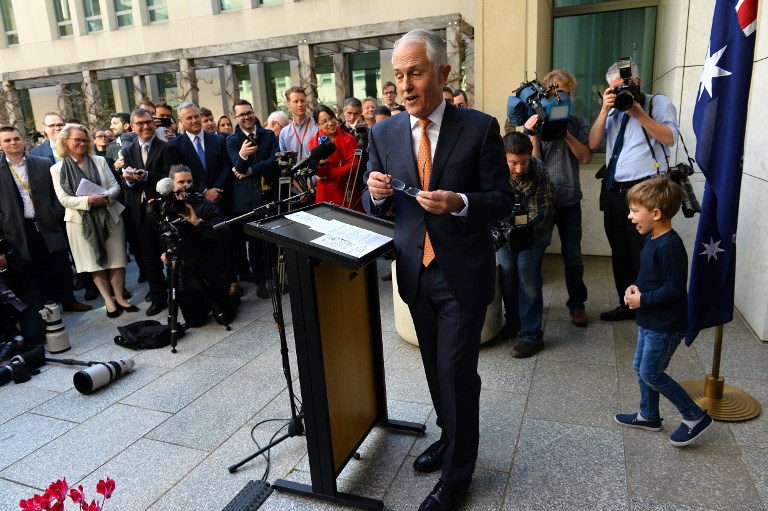
Australia’s outgoing Prime Minister Malcolm Turnbull (C) speaks at a press conference in Canberra on August 24, 2018. Tresurer Scott Morrison was installed as Australia’s seventh prime minister in 11 years on August 24 after a stunning Liberal party revolt instigated by hardline conservatives unseated moderate Malcolm Turnbull. / AFP PHOTO / SAEED KHAN
SYDNEY – Malcolm Turnbull bowed out as Australian Prime Minister on Friday, warning his fellow parliamentarians against the “chaos” of their self-obsessions that saw yet another leader politically assassinated.
Always something of an outsider in his own party, Turnbull maintained the air of calm detachment that has marked his premiership as he blasted a political class he said had left voters “dumbstruck and so appalled”.
“It was described as madness by many, and… in so far as there has been chaos this week, it has been created by the wreckers,” he said.
Turnbull – a popular politician viewed as a moderate in his conservative Liberal Party – constantly fought off right-wing agitators during his near three-year stint at the helm.
He was finally undone by a determined challenge from his own Home Affairs Minister Peter Dutton, who himself lost out to a stealth campaign by Treasurer Scott Morrison in a party ballot.
The unedifying scramble for power sparked derision among the commentariat and the public at large – a sentiment Turnbull gave voice to on Friday.
“The critical thing is, with politics, it’s not about the politicians,” he said.
“That’s why this week has been so dispiriting, because it just appears to be, you know, vengeance, personal ambition… It hasn’t had anything to do with 25 million Australians,” he also said.
The silver-tongued 63-year-old, who was accompanied by his grandchildren at his farewell press conference, had pledged to leave parliament if he was unseated as prime minister.
The transition to civilian life should be smooth for Turnbull, one of Australia’s wealthiest parliamentarians; politics was his fifth career after previous stints as a journalist, banker, lawyer and businessman.
Charmed life
Born in Sydney in 1954, Turnbull was raised by his father after his mother walked out on the family.
But he parlayed that ostensibly difficult start in life into success wherever he went.
A Rhodes scholar at Oxford, he was briefly a journalist before turning to the law, where he represented former MI5 spook Peter Wright in his successful battle against the British government in the “Spycatcher” case.
Much of his personal fortune came from his next incarnation as a merchant banker with Goldman Sachs and from his later investments in technology start-ups.
Then in 2004, he entered public life, representing the Liberals in the well-heeled Sydney seat of Wentworth.
Apparently more comfortable in his own skin than many in his political cohort, it was a short hop to party leadership four years later.
But the Liberal party struggled to reconcile itself to a man whose socially liberal, metropolitan views were at odds with the party’s right wing, who despised his progressive stance on global warming and same-sex marriage.
Ousted by Tony Abbott the following year, he spent half a decade on the backbenches, where he remained a popular figure among the public at large.
In 2015 the party struck an uneasy truce with itself, and acknowledged Turnbull represented its best electoral bet. He delivered them to power a year later.
His almost three years in the top job have seen him strut the world stage with the aplomb of a man born to the role.
A combative first phone call with newly minted US President Donald Trump, in which they clashed over an immigration deal, burnished his credentials at home as a sophisticated statesman who compared favourably with the rough political neophyte.
But a wafer-thin parliamentary majority left him at the mercy of his party’s right-wing, and he struggled to loft his liberal agenda above the fray. /kga